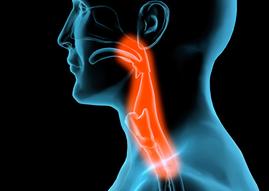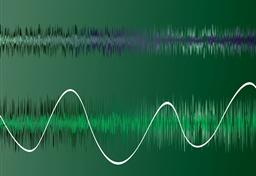Dispersion Testing
Each of the manufacturers’ electrodes, eSwallow, VitalStim, and Guardian were subjected to a dispersion test. The dispersion test was performed using a low current power supply, electrode and conductive, illuminating thermal membrane. Each manufacturer’s electrode was applied to the membrane. The power supply positive terminal was connected to the electrode the negative terminal was connected to the frame of the thermal membrane. The power supply was then powered on to generate a current flow through the electrode and the thermal membrane. The flow of current from the electrode into the thermal membrane generates heat which causes discoloration of the thermal membrane. Figure 1 shows a picture of the dispersion test setup.

Figure 1. Picture of the Dispersion Test setup.
Figure 2 is a picture of the conductive, illuminating thermal membrane during the Dispersion Test. The Guardian electrode is on the far left, the eSwallow in the middle and the VitalStim on the right on the thermal membrane. As you can see the eSwallow electrode has a bigger illuminated circle showing that the current is spread evenly across the entire electrode. The Guardian has a small circle showing current concentrated in a much smaller area than the eSwallow electrode. The VitalStim has an oval heated area larger than the Guardian but less than half of the surface area of the eSwallow electrode.

Figure 2. Picture of the illuminated, conductive thermal membrane during the Dispersion Test.
NMES Training Online

eSWALLOW is revolutionizing Neuromuscular Electrical Stimulation (NMES) therapy for the treatment of dysphagia. Now, that same revolution is taking place in the area of NMES training for the treatment of dysphagia.
Dysphagia

Dysphagia is a medical condition in which an individual experiences difficulty in swallowing. This condition is often the result of a stroke or radiation therapy. It is also common in Parkinson’s, Multiple Sclerosis, and Cerebral Palsy patients.
NMES

Electrical stimulation therapy has proven to be the most effective treatment for dysphagia. Electrical current is used to stimulate key muscles while the patient practices swallowing. The result is greatly improved swallowing function through muscle re-education.

